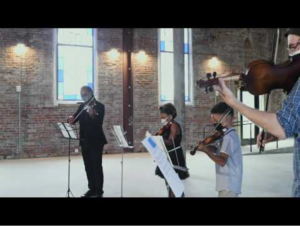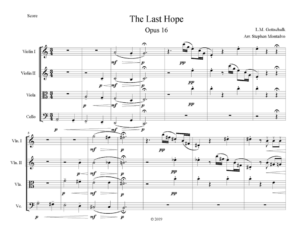My Mellon-funded community-engaged scholarship project led to a collaboration with a local community music education organization, Make Music NOLA. Make Music NOLA’s connections with the Center for Public Service are extensive, with Tulane students serving as music mentors. daily activities include leading orchestra instruction for small groups of elementary-aged children through their service-learning coursework. Make Music NOLA engages in community music education for social change, “creating access and opportunity for students who are eligible for free or reduced lunch in Orleans Parish through intensive music training.”
A few ideas emerged from our initial discussions, however, one salient issue stood above the rest. The string music program relied upon a traditional music pedagogical system known as the Suzuki Method, a method known for drawing parallels between early language acquisition, mother-tongue, and music education. Parental involvement is another distinct feature of the method. However, the repertoire the method leans on tends to be skewed heavily towards the traditional canon of Western classical music. Now keeping in line with the principles of language acquisition of the mother language, as a team, we sought to diversify the repertoire to better reflect the relevant culture, interests, and identity of the local New Orleans student population. Reflections from our discussions settled on developing a catalogue of works to arrange to address this gap.
In short, the Make Music NOLA Curriculum Expansion and Method Book Project emerged as a way to solve problems around musical representation and diversity in community music education repertoire and curricula. It became clear that we needed to provide pedagogical materials and music that not only reflected the past and present culture of the students but also broadened their exposure to the sounds and rhythms of other cultures. We used this as an opportunity to also teach them history and the culture around the music, from New Orleans as well as beyond. We pulled music by BIPOC composers from South America, Africa, past, and present to populate our growing catalogue of arrangements.
Examples of arrangements include Lift Every Voice and Sing, I Care by Beyoncé, Alf Laila wa Laila by Oum Kalthoum, Freedom Highway by Rhiannon Giddons, and the minuets by Ignatius Sancho and many more now sit alongside works by Bach and other Western classical composers in the method book.
We also sought to parallel the technical demands and progressions in our method book with the ones in the Suzuki Book. As such if there was an emphasis on a particular rhythmic pattern, learning a new string, or executing a new articulation then we would be sure to identify works suitable for adaptation with those technical considerations in mind.
Funding from various Mellon grants was used for the creation and digitization of curriculum materials, specific to Make Music NOLA’s curriculum and resource library. We catalogued and organized arrangements of orchestral works by marginalized composers, and included worksheets explaining the historical context, theory, and life of the composer in the books. Expenses also covered staff time for this specific project, teaching artist stipends for the creation of materials, technology updates, and printing and digitization of materials. With Book 1 finished, the result will be 15-20 new arrangements for Make Music NOLA’s repertoire library and a 50+ curriculum manual, both print and digital. The goal is to eventually share this with other interested stakeholders as the project continues to expand.

Minuet by Ignatius Sancho Video
Teachers and students collaborate to perform a minuet by Ignatius Sancho, an 18th-century BIPOC composer and abolitionist.

The Last Hope, a piano piece by Louis Moreau Gottschalk, a composer from New Orleans, arranged for string quartet.
